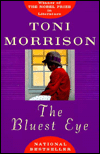 Finally finished reading Toni Morrison's The Bluest Eye. (Toni Morrison is winner of the 1993 Nobel Prize for Literature.) A sticker on the front cover announces that this book is a selection of Oprah's Book Club. Wow, no wonder this book is good. (Ahem.) The book is pretty thin, about half an inch, but it's not the kind of book that you speed read. First heard of Toni Morrison from a book club magazine when her book Love came out.
Finally finished reading Toni Morrison's The Bluest Eye. (Toni Morrison is winner of the 1993 Nobel Prize for Literature.) A sticker on the front cover announces that this book is a selection of Oprah's Book Club. Wow, no wonder this book is good. (Ahem.) The book is pretty thin, about half an inch, but it's not the kind of book that you speed read. First heard of Toni Morrison from a book club magazine when her book Love came out.The story is pretty simple - incest in a sleepy town and how people react to it. Eleven-year old Pecola Breedlove is ugly and poor. Victimized by her own father, she prays that she'll have the blondest hair and the bluest eye, so that her world will become different. Most of the book is devoted to character development. You can almost imagine in your mind's eye each of the characters and how they look. The author is so good with words. Read the following passages from The Bluest Eye, and you'll know what I mean.
"We in this colony took as our own the most dramatic, and the most obvious, of our white master's characteristics, which were, of course, their worst. In retaining the identity of our race, we held fast to those characteristics most gratifying to sustain and least troublesome to maintain. Consequently, we were not royal but snobbish, not aristocratic but class-conscious; we believed authority was cruelty to our inferiors, and education was being at school. We mistook violence for passion, indolence for leisure, and thought recklessness was freedom. We raised our children and reared our crops, we let infants grow, and property develop. Our manhood was defined by acquisitions. Our womanhood by acquiescence. And the smell of your fruit and the labor of your days we abhorred."
"All of our waste which we dumped on her and which she absorbed. And all of our beauty, which was hers first and which she gave to us. All of us - all who knew her - felt so wholesome after we cleaned ourselves on her. We were so beautiful when we stood astride her ugliness. Her simplicity decorated us, her guilt sanctified us, her pain made us glow with health, her awkwardness made us think we had a sense of humor. Her inarticulateness made us believe we were eloquent. Her poverty kept us generous. Even her waking dreams we used - to silence our own nightmares. And she let us, and thereby deserved our contempt. We honed our egos on her, padded our characters with her frailty, and yawned in the fantasy of our strength. And fantasy it was, for we were not strong, only aggressive; we were not free, merely licensed; we were not compassionate, we were polite; not good, but well behaved. We courted death in order to call ourselves brave, and hid like thieves from life. We substituted good grammar for intellect; we switched habits to simulate maturity; we rearranged lies and called it truth, seeing in the new pattern of an old idea the Revelation and the Word. She, however, stepped over into madness, a madness which protected her from us simply because it bored us in the end."
No comments:
Post a Comment